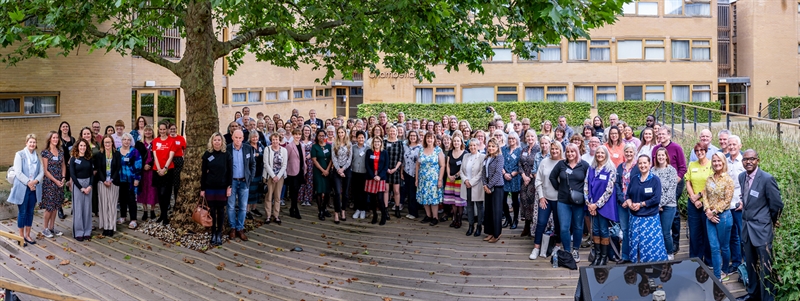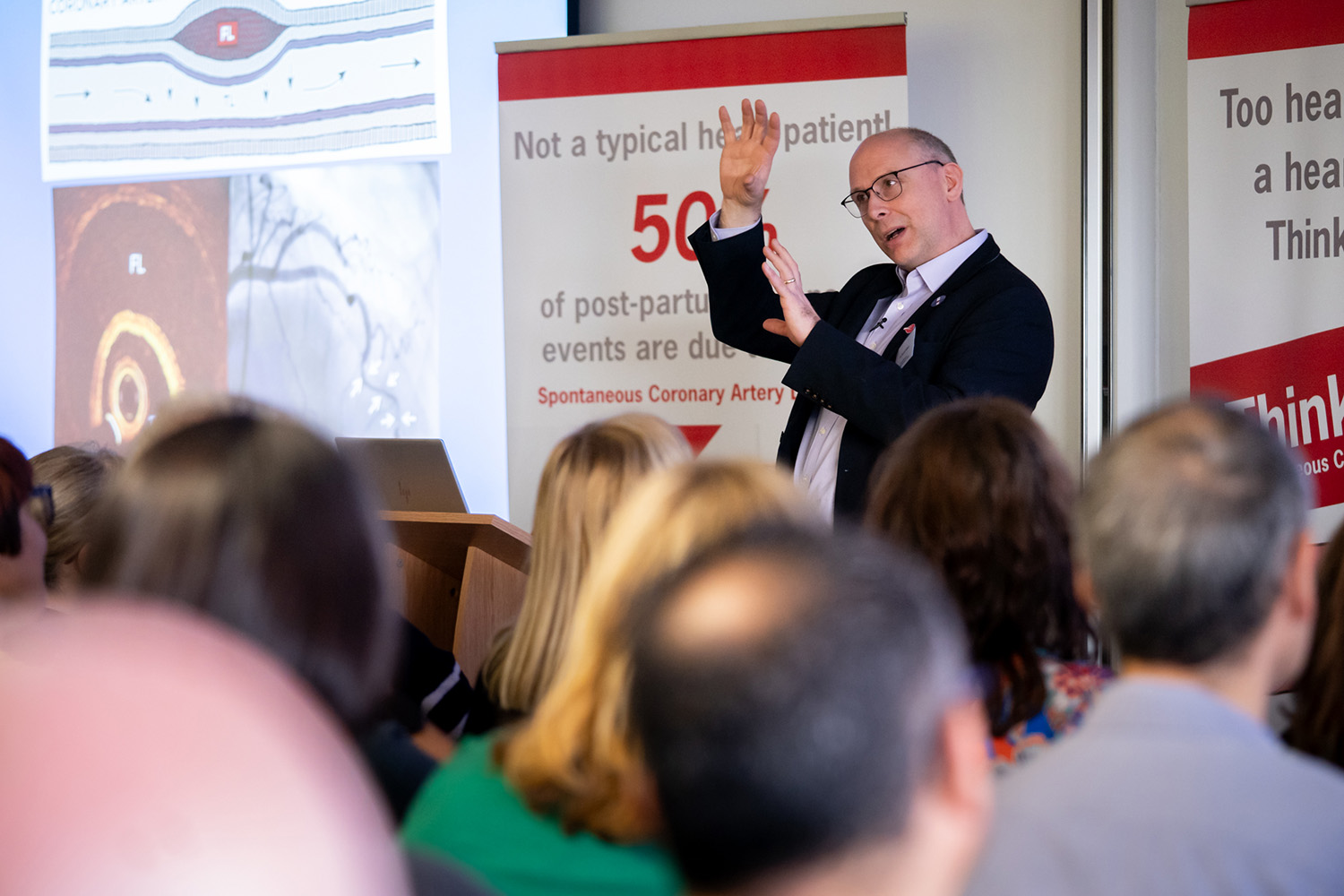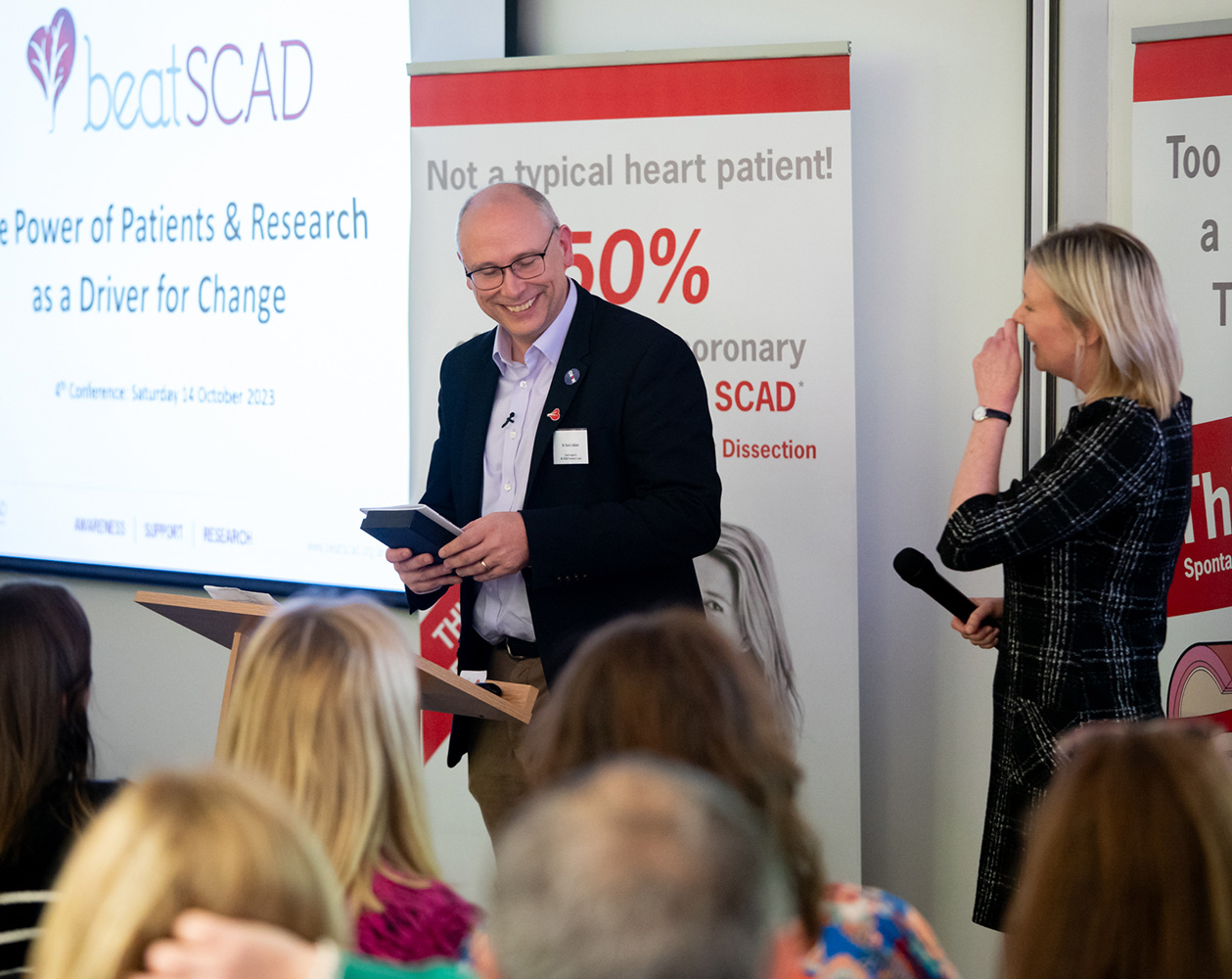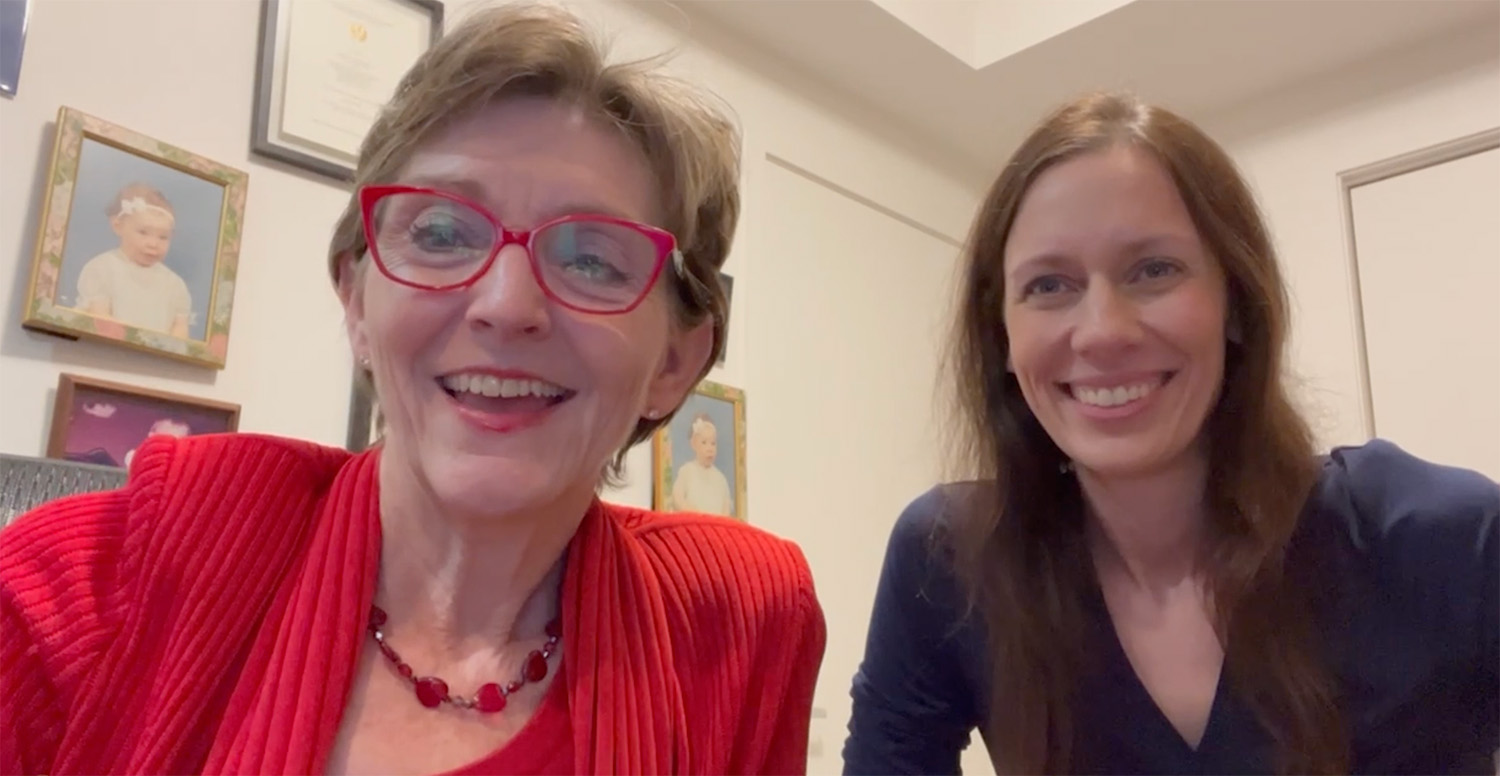The fourth Beat SCAD Conference took place in Leicester on 14 October and celebrated 10 years of UK SCAD research.
We welcomed 130 delegates, including 70 SCAD patients, their families and friends, and healthcare professionals and researchers.
Starting off the day, Rebecca Breslin, Chair and Co-founder of Beat SCAD, highlighted the charity's successes and discussed our aims for the future. The theme of the day was The Power of Patients and Research as a Driver for Change and Rebecca recalled the first meetings between patients and researchers in Leicester in 2013 that led to the research project being set up.
She went on to acknowledge the important part volunteers play in the success of Beat SCAD in raising awareness, supporting those affected by SCAD and funding research. We are currently looking for volunteers in the areas of volunteer management, fundraising, social media and more, so if you're interested in helping please contact us.
She then announced that Beat SCAD has increased its previous award to fund a two-year Clinical Research Fellow position by £98.6K to be the majority funder of a three-year PhD position, which will be filled by Dr Anju John.
SCAD research
Dr David Adlam, who is leading the SCAD research in Leicester, then took the floor and talked about what we know about SCAD after 10 years of research. Discussing the question how common is SCAD?, he revealed that the SCAD clinics will see more than 400 patients this year and there are possibly four times that number across the UK, meaning that at least four SCADs probably occur in the UK every day.
He then discussed how patients present with SCAD, the pros and cons of invasive angiography versus CT scans for diagnosing SCAD and the preference for conservative management where possible. Chest pain after SCAD is well recognised and for most patients this will get better after 18 months to two years.
Dr Adlam then went on to say more capacity is needed for SCAD clinical services and that it's critical for these services to be networked for research and educational purposes. He announced that there is a funded pilot Scottish SCAD clinic at Forth Valley Royal Hospital in Larbert, led by Dr Anne Scott and Dr Clare Murphy. This will be supported in person by Dr Adlam for at least the first 12-months. He will continue to support the team thereafter as part of a UK-wide SCAD multidisciplinary team. Furthermore, along with the existing clinic at the Chelsea & Westminster Hospital run by former Clinical Research Fellow Dr Abtehale Al-Hussaini, another clinic is launching at Hammersmith Hospital, run by Dr Rasha Al-Lamee again supported in person by Dr Adlam.
Recovery from SCAD
Professor Lis Neubeck, Head of the Centre for Cardiovascular Health at Edinburgh Napier University, gave the next presentation, discussing what we know about physical and mental recovery from SCAD. She talked about the systematic review of physical and psychosocial recovery of SCAD patients, which found that cardiac rehab exercise is not tailored to SCAD patients and there is no clear guidance on what physical activity patients should do.
Professor Neubeck talked about the need to develop a SCAD-specific cardiac rehab programme, including information on heavy bleeding during periods, contraception and pregnancy, menopause and HRT, recurrent chest pain, high blood pressure, PTSD, anxiety and depression and exercise recommendations.
Fibromuscular Dysplasia
Many SCAD patients are also diagnosed with Fibromuscular Dysplasia (FMD) and Dr Tina Chrysochou, Consultant Nephrologist at Salford Royal and UK lead for the UK FMD study, provided a review of what FMD is, how it is identified and what SCAD patients should know about it. The PHACTR1 genetic discovery from 2019 is relevant for both SCAD and FMD patients (watch Dr Adlam talk about this here).
Dr Chrysochou (pictured) explained how she set up the UK's first multi-disciplinary FMD clinic in Salford. She also provided an update on the European/International Fibromuscular Dysplasia Registry and Initiative (FEIRI). The UK FMD Study gained full ethical approval in 2022 and will be the UK arm of FEIRI. It started recruiting patients in January 2023.
Adjusting to life after SCAD
Beat SCAD Trustee Sarah Coombes gave an insight into her experience supporting SCAD patients in the Facebook support group and one-to-one. She described the different types of patients, from those who are shell-shocked, through those who say/think they are fine, to the Mrs/Mr Busy, who don't have time to have a heart attack!
She told delegates recovery is very individual and highlighted the support available, including the Beat SCAD Buddy Service.
Patient engagement in research
Liz Ward, Public Engagement Co-ordinator, NIHR Leicester Biomedical Research Centre (BRC), discussed how the BRCs is enabling pioneering research into medical advancements in Leicester by bringing together academics and clinicians to translate scientific discoveries into potential new treatments, diagnostics and technologies. The BRC has been supportive of the SCAD research from the start and the project has been a great example of how patient engagement with research can move it forward.
SCAD research update
Dr Adlam then discussed the research, how it began and how collaboration has become a key element, with researchers and clinicians across the world working together to investigate all aspects of SCAD.
He said in the past 10 years, there have been 41 scientific papers, editorials or reviews about SCAD; European and US consensus and position statements; one textbook chapter; many presentations and talks across the UK and internationally and said SCAD is now (finally) recognised as a distinct entity in international heart attack guidelines.
He explained the findings of the GWAS (Genome Wide Association Study), published in May and updated the delegates on other research papers.
Looking to the future, he posed some questions that could be considered for research, including how do genes alter arterial function and vulnerability in SCAD? And what roles do female sex hormones and emotional stress play in SCAD?
A message from the Mayo Clinic
Before closing the Conference, Rebecca played a video message for Dr Adlam from Dr Sharonne Hayes and Dr Marysia Tweet from the Mayo Clinic congratulating him and his team on a decade of research. Dr Hayes and Dr Tweet started to research SCAD in 2009 and when Dr Adlam was looking to set up a SCAD research programme in the UK, he contacted Dr Hayes and that collaboration has continued during the past 10 years.
“We are so pleased to have been able to host a Conference this year after Covid prevented us doing it in 2020,” said Rebecca. “We are very proud of all the charity has achieved and in awe of all our fundraisers who have enabled us to donate £396,000 to the UK SCAD research project. We look forward to Dr Anju John joining the research team and pushing the research forward over the next three years.”
Thanks to everyone who attended and made the day such a success. We hope you enjoyed meeting other SCAD patients, families, friends and healthcare professionals. Thanks also to the team at the venue, Leicester College Court, for helping the day run smoothly and to the team at Triskelle Pictures, who did such a wonderful job of recording the presentations and taking photos.






